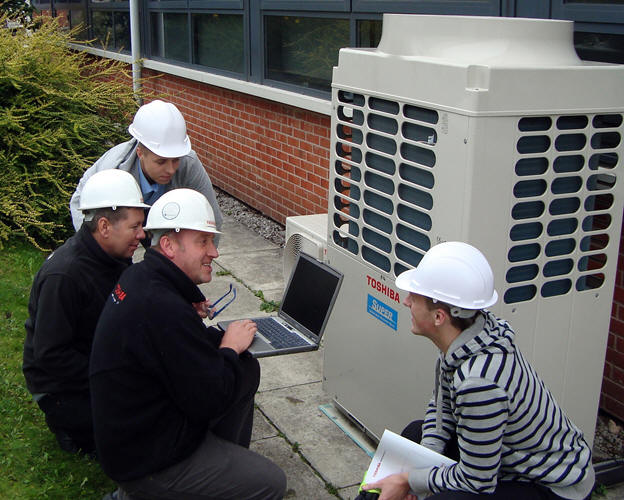 Ultraviolet
light is used for a wide variety of
processes across the fields of science,
medicine, and even home improvement. While
the application of UV lighting in HVAC
systems is not as widespread as its use in
laboratories and hospitals, the science
behind it remains the same: ultraviolet
light has the potential to eliminate the
spread of bacteria and mildew. At
Home
Improvement Leads, we believe that
technology and home improvement should go
hand in hand, and that HVAC professionals
can use science to improve their practices.
This article highlights the importance of UV
lighting in HVAC systems. Ultraviolet
light is used for a wide variety of
processes across the fields of science,
medicine, and even home improvement. While
the application of UV lighting in HVAC
systems is not as widespread as its use in
laboratories and hospitals, the science
behind it remains the same: ultraviolet
light has the potential to eliminate the
spread of bacteria and mildew. At
Home
Improvement Leads, we believe that
technology and home improvement should go
hand in hand, and that HVAC professionals
can use science to improve their practices.
This article highlights the importance of UV
lighting in HVAC systems.
The science behind UV light
Ultraviolet light, or light that cannot be
seen by the naked eye, is traditionally used
in both scientific and medicinal fields for
a variety of reasons. UV-Cs, the third type
of ultraviolet rays, are used for
ultraviolet germicidal irradiation, or the
removal of bacteria, mold, and other
pathogens in order to increase the air
quality of a particular space.
A scientific study undertaken by members of
the Faculty of Biological Science and the
Department of Chemical Engineering at the
University of Tulsa, Oklahoma in 2000, shows
its importance. Researchers demonstrated
that fungal levels both in the insulation of
HVAC office building air-handling units and
in the office environment as airborne
bacteria decreased significantly after the
repeated and long term use of germicidal UV
light. This practice has been adopted by
HVAC professionals in both commercial and
residential areas in order to increase the
air quality of both HVAC units and homes.
Why use UV lights in
a home HVAC system?
While HVAC professionals advocate the use of
UV lights in HVAC systems, many homeowners
want to know the benefits of UV lighting for
both their units and their homes. Primarily,
this technology is used to eliminate mold
and mildew in both the HVAC unit (including
the insulation and the wider unit) and the
home, decreasing the amount of stationary
and airborne bacteria traveling through the
system and into the home. Research suggests
that repeated and continued use of UV
lighting in HVAC units decreases the risk of
air contamination and possible illness due
to exposure of mold, bacteria, and other
airborne pathogens that are often present
inside HVAC systems.
Factors to take into consideration before
choosing UV in your unit
Before homeowners make the decision to
choose an HVAC unit with UV germicidal
irradiation, there are several factors to
consider.
First, the placement of UV lamps can affect
the effectiveness of germicidal irradiation.
If placed incorrectly, these lamps will not
function properly and will offer little in
the way of bacterial and germicidal
prevention. Similarly, the intensity and
number of lamps will affect the optimum
function of the UV lighting inside the HVAC
unit.
The temperature and humidity of the HVAC
unit itself will affect the performance of
UV lighting, so making sure the atmosphere
is between 72 and 105 degrees Fahrenheit and
not too damp is essential for
optimum
performance.
Another concern homeowners may have about UV
lighting in HVAC systems is energy use,
since high pressure lamps will consume more
energy than low or medium pressure lamps.
Choosing the correct lamp for each
individual unit is essential for energy
savings and best practice.
Regular maintenance and a limited lifespan
of UV lighting in HVAC units is yet another
issue that homeowners need to be made aware
of. Most UV lamps will need to be regularly
checked and cleaned, and will need to be
replaced every one to three years.
In short, itís essential that homeowners are
made aware of both the benefits and
potential drawbacks of UV lighting in HVAC
systems. Choosing HVAC professionals who
understand the intricacies of this
particular technology and who are capable of
performing regular checkups on the products
in potentially dangerous situations (burns
from UV rays and mercury exposure from the
lamps are serious and complex risks) is
paramount. If you and your HVAC business
choose to stock and sell UV lighting for
HVAC units, make sure you are properly
educated and trained in this area in order
to provide the best possible service in the
safest way possible.
###
|
